It’s tempting to think of digital transformation as being about systems and processes – making them faster, smarter, cheaper. It always surprises me how true that is even of business functions which revolve around people – like HR. In a world where so much of our professional and private lives is driven by technology, even down to the way that we interact with each other on a daily basis, it’s understandable. But one of the most important messages I can give you is that successful digital transformation of a business is, first and foremost, about people.
As an internationally recognised keynote speaker, certified trainer and award-winning coach on digital leadership, I’m often asked to speak on the HR stage, and in my ‘Future of Work’ keynote I discuss the different ways that digital transformation impacts on business, and the areas that it affects (hint: it’s all of them). In my recent talk at Digital Series in Kuala Lumpur, I was talking mostly to HR professionals, so in this article I’ll be sharing some of those insights with you, focussing on people transformation, and what it means for the future of your organisation.
I’ll look at:
- The skills and attributes you need to look for in future thought leaders
- Why you need to transform, not change
- Focussing on people, not process
- What HR leaders need to focus on now
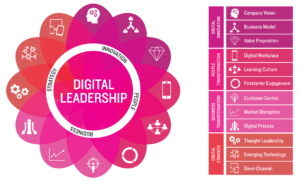
As with any transformation, in any area of the business, strong, capable and future-facing leadership is key. So getting the right people in the right positions is essential. As HR leaders, what should you be looking for in your new talent or developing in your existing workforce?
THE SKILLS AND ATTRIBUTES TO LOOK FOR IN FUTURE DIGITAL LEADERS
a) The ability to provide vision and purpose
Always important, but particularly so when a business needs to go through a transformation process (and in modern business, that process is continuous), leadership needs to provide a guiding light, giving employees a clear direction towards a shared vision for the organisation.
When leadership is able to make aspirations clear across the business, the vision drives decision-making. When everyone in the organisation believes in, and has ownership of, the shared vision, employees feel a part of the bigger picture and engaged in the journey to becoming digitally mature.
b) Creating conditions in which people are empowered to experiment
Digitally mature organisations are agile and innovative, able to experiment fast and learn faster, seeing every new innovation, whether successful or not, as a lesson. When ‘failure’ is able to happen fast, the opportunity to turn the lesson into success comes around faster. Effective digital leaders, as well as embracing concepts like agile development and minimum viable products; create an environment where people are encouraged to experiment, and supported to try out new and innovative ideas.
Agile development has mostly been associated with technology development, but there is no reason why the same philosophy of sprint-based working can’t be applied to any form of work. So your organisation needs digital leaders able to drive new ways of working and support a culture of innovation.
c) Empowering people to think differently
Transformation relies on people being able to think beyond the usual and ordinary. Steve Jobs is a celebrated digital leader because he saw Xerox’s PARC technology, imagined what no one else ever had, used it to develop the first Graphical User Interface and ushered in a new era of personal computing, changing the world.
Your digital leaders must also enable your employees to connect better with customer needs, to understand what they’re looking for in a product or service. – what is it that the customer is looking for in the product? An improved experience or service delivery, increased capability, or reduced cost? Digital leaders empower employees to discover what the customer needs, and make it happen.
d) Facilitating cross-boundary collaboration
The modern workspace is breaking down boundaries in the way that people work, where they work, between disciplines and between people and technology. And, as businesses prepare to embrace Generation Z in the workplace, this change will accelerate. Moving a business towards a common vision relies on everyone collaborating, which requires a digital leader with the skills to inspire and empower.
As HR leaders, you are likely to be in the advance guard when it comes to driving developments in your organisation. One thing I always stress when I’m speaking, training or coaching is:
WHY YOU NEED TO TRANSFORM, NOT CHANGE
There’s an important distinction, and successful businesses of the future will embrace transformation rather than simply change.
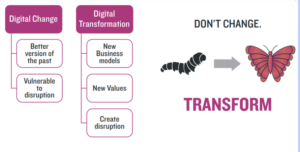 Why?
Why?
Change builds on the past, and remains vulnerable to disruption, whereas transformation creates and drives disruption, using new business models and values to create a stronger business.
FOCUS ON PEOPLE, NOT PROCESS
In my training for digital leaders I like to use this simple acronym:
P Position yourself as a digital leader
E Evolve your technical skills,
O take Ownership of community,
P Promote what you are doing,
L Love what you do,
E Engage offline to online to humanise the technology
Whenever there is change in the workplace there’s a risk of employee disengagement and decreased productivity, leading to a reduction in profitability, and, potentially, failure. So for digital transformation to be effective, and result in a customer focussed, future-facing organisation, it needs to start with people.
If the culture isn’t working now, the transformation process gives you an opportunity to redefine it. Failure to take that opportunity could result in resistance to change, as people perceive it as a threat, likely to be a risk to their future employment.
Understanding what people need, from customers to employees, must drive any process changes – not the other way around.
You may need to radically review the company structure and roles, and allow new ways of working to drive how your internal processes work.
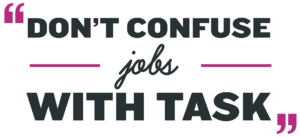
Don’t confuse jobs with tasks – focus on optimising the combination of human and automated work to make the most of human skills that your workforce possesses. Tasks can be automated, to free up people to innovate.
WHAT HR LEADERS NEED TO PAY ATTENTION TO NOW
i. Using AI to enhance the candidate experience and improve talent acquisition.
For many companies, AI increases productivity in the recruitment process, reducing hiring time and delivering an enhanced experience for candidates. AI can be used to reduce the screening time, improve the completion rate of job applications and respond to candidate queries. Reducing the screening time frees up recruiters to use their human intelligence more productively – marketing, engaging with candidates and hiring.
ii. Identifying uniquely human skills – as these will grow in importance
As AI takes over more basic tasks, jobs will be displaced. The World Economic Forum predicts that this could account for 75 million jobs. But jobs requiring human skills will grow, with 133 million new jobs created, requiring people skilled in emotional intelligence, and technical skills like design and programming.
It’s predicted that ultimately, AI will create more jobs than it takes away, and for now, the focus will need to be on how AI can help existing workers to do their jobs better. But it is already creating new jobs, and there are some fascinating studies by Cognizant identifying new jobs in the future of work.
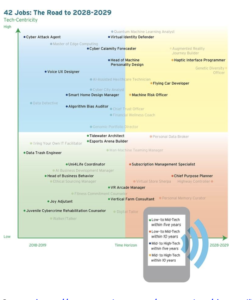
As a digital innovator myself, I’m fascinated by these new roles. How about ‘Head of Machine Personality Design’ or ‘Virtual Identify Defender’, both of which are emerging within the next 5 years?
iii. Getting your workforce AI ready
As AI moves into the workplace, up-skilling workers will be crucial. But first, you need to know why you’re adopting AI. What’s the business problem it’s going to solve for you? The sooner you start collecting data, and training and educating your teams on the business benefits, the sooner you’ll be ready to implement solutions.
This will mean identifying learning opportunities for key HR roles, focussing on the areas that AI could impact – like recruiting, on-boarding new joiners and corporate learning.
There’s a great article by Jeanne Meister on Forbes which give you some thought-provoking ideas on the future impact of AI on HR roles.
KEY ELEMENTS OF DIGITAL TRANSFORMATION
I love to focus on helping business leaders to navigate innovation in the digital age to maximise growth opportunities and overcome potential challenges and threats. These are the essentials needed for future digital leadership:
- Emerging technology
- Future of work
- Upskilling your workforce
- Digital leadership
- Digital Governance
I often share the latest innovative technology trends in order to help develop new digital leadership skills and understand more about the future of work. You can read more about aspects of becoming an effective digital leader and find out more about the CMI Level 7 Digital Transformation and Innovation course here
Ready to produce game-changing digital results in your business?
Subscribe to receive cutting edge insights on digital leadership and transformation- straight to your inbox
We do not sell or share your information with anyone.






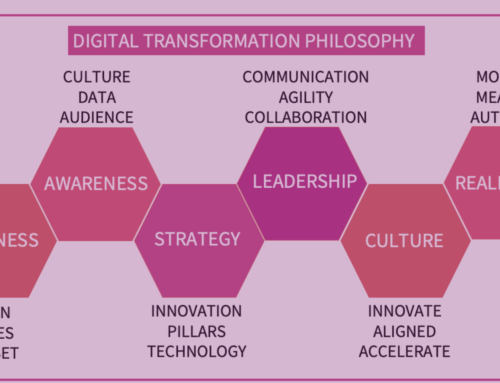



You are at the cutting edge, Warren. You are exactly right: the old type ‘personnel’ managers dealt with people. Today’s HR are number crunchers and it’s about transforming, not changing; people, not processes and creating conditions in which people are empowered. In our case, women are experiencing a metamorphosis as they transition menopause and we are changing women’s lives but the biggest challenge is engagement with HR for all the above reasons.
Thanks Kathryn and it’s an area that’s not spoken about very often, so well done
Very nice hope everyone read this
Thank you Nizwa, that’s definitely my intention ?